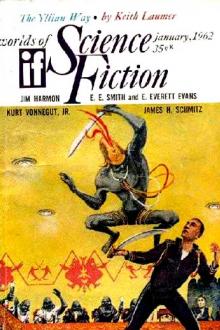Bat Wing, Sax Rohmer [top 20 books to read .txt] 📗

- Author: Sax Rohmer
Book online «Bat Wing, Sax Rohmer [top 20 books to read .txt] 📗». Author Sax Rohmer
“You mean that you have been frightened at night?” I asked with curiosity.
“Dreadfully frightened.”
“Won’t you tell me in what way?”
She looked up at me swiftly, then turned her head aside, and bit her lip.
“No, not now,” she replied. “I can’t very well.”
“Then at least tell me why you stayed?”
“Well,” she smiled rather pathetically, “for one thing, I haven’t anywhere else to go.”
“Have you no friends in England?”
She shook her head.
“No. There was only poor daddy, and he died over two years ago. That was when I went to Nice.”
“Poor little girl,” I said; and the words were spoken before I realized their undue familiarity.
An apology was on the tip of my tongue, but Miss Beverley did not seem to have noticed the indiscretion. Indeed my sympathy was sincere, and I think she had appreciated the fact.
She looked up again with a bright smile.
“Why are we talking about such depressing things on this simply heavenly day?” she exclaimed.
“Goodness knows,” said I. “Will you show me round these lovely gardens?”
“Delighted, sir!” replied the girl, rising and sweeping me a mocking curtsey.
Thereupon we set out, and at every step I found a new delight in some wayward curl, in a gesture, in the sweet voice of my companion. Her merry laugh was music, but in wistful mood I think she was even more alluring.
The menace, if menace there were, which overhung Cray’s Folly, ceased to exist—for me, at least, and I blessed the lucky chance which had led to my presence there.
We were presently rejoined by Colonel Menendez and Paul Harley, and I gathered that my surmise that it had been their voices which I had heard proceeding from the top of the tower to have been only partly accurate.
“I know you will excuse me, Mr. Harley,” said the Colonel, “for detailing the duty to Pedro, but my wind is not good enough for the stairs.”
He used idiomatic English at times with that facility which some foreigners acquire, but always smiled in a self-satisfied way when he had employed a slang term.
“I quite understand, Colonel,” replied Harley. “The view from the top was very fine.”
“And now, gentlemen,” continued the Colonel, “if Miss Beverley will excuse us, we will retire to the library and discuss business.”
“As you wish,” said Harley; “but I have an idea that it is your custom to rest in the afternoon.”
Colonel Menendez shrugged his shoulders. “It used to be,” he admitted, “but I have too much to think about in these days.”
“I can see that you have much to tell me,” admitted Harley; “and therefore I am entirely at your service.”
Val Beverley smiled and walked away swinging her book, at the same time treating me to a glance which puzzled me considerably. I wondered if I had mistaken its significance, for it had seemed to imply that she had accepted me as an ally. Certainly it served to awaken me to the fact that I had discovered a keen personal interest in the mystery which hung over this queerly assorted household.
I glanced at my friend as the Colonel led the way into the house. I saw him staring upward with a peculiar expression upon his face, and following the direction of his glance I could see an awning spread over one of the gray-stone balconies. Beneath it, reclining in a long cane chair, lay Madame de Stämer. I think she was asleep; at any rate, she gave no sign, but lay there motionless, as Harley and I walked in through the open French window followed by Colonel Menendez.
Odd and unimportant details sometimes linger long in the memory. And I remember noticing that a needle of sunlight, piercing a crack in the gaily-striped awning rested upon a ring which Madame wore, so that the diamonds glittered like sparks of white-hot fire.
CHAPTER VI. THE BARRIER
Colonel Menendez conducted us to a long, lofty library in which might be detected the same note of un-English luxury manifested in the other appointments of the house. The room, in common with every other which I had visited in Cray’s Folly, was carried out in oak: doors, window frames, mantelpiece, and ceiling representing fine examples of this massive woodwork. Indeed, if the eccentricity of the designer of Cray’s Folly were not sufficiently demonstrated by the peculiar plan of the building, its construction wholly of granite and oak must have remarked him a man of unusual if substantial ideas.
There were four long windows opening on to a veranda which commanded a view of part of the rose garden and of three terraced lawns descending to a lake upon which I perceived a number of swans. Beyond, in the valley, lay verdant pastures, where cattle grazed. A lark hung carolling blithely far above, and the sky was almost cloudless. I could hear a steam reaper at work somewhere in the distance. This, with the more intimate rattle of a lawn-mower wielded by a gardener who was not visible from where I stood, alone disturbed the serene silence, except that presently I detected the droning of many bees among the roses. Sunlight flooded the prospect; but the veranda lay in shadow, and that long, oaken room was refreshingly cool and laden with the heavy perfume of the flowers.
From the windows, then, one beheld a typical English summer-scape, but the library itself struck an altogether more exotic note. There were many glazed bookcases of a garish design in ebony and gilt, and these were laden with a vast collection of works in almost every European language, reflecting perhaps the cosmopolitan character of the colonel’s household. There was strange Spanish furniture upholstered in perforated leather and again displaying much gilt. There were suits of black armour and a great number of Moorish ornaments. The pictures were fine but sombre, and all of the Spanish school.
One Velasquez in particular I noted with surprise, reflecting that, assuming it to be an authentic work of the master, my entire worldly possessions could not have enabled me to buy it. It was the portrait of a typical Spanish cavalier and beyond doubt a Menendez. In fact, the resemblance between the haughty Spanish grandee, who seemed about to step out of the canvas and pick a quarrel with the spectator, and Colonel Don Juan himself was almost startling. Evidently, our host had imported most of his belongings from Cuba.
“Gentlemen,” he said, as we entered, “make yourselves quite at home, I beg. All my poor establishment contains is for your entertainment and service.”





Comments (0)